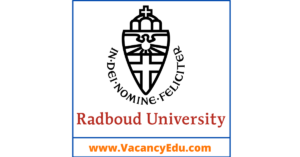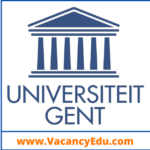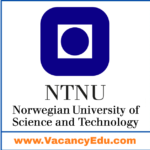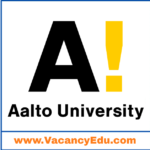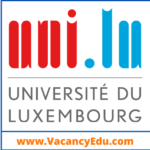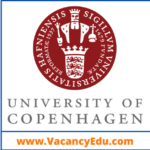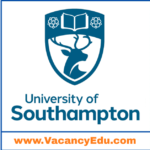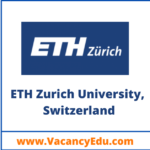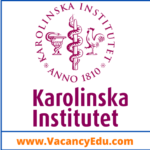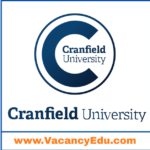Radboud University, Nijmegen, Netherlands invites online Application for number of Fully Funded PhD Degree at various Departments. We are providing a list of Fully Funded PhD Programs available at Radboud University, Nijmegen, Netherlands .
Eligible candidate may Apply as soon as possible.
(01) PhD Degree – Fully Funded
PhD position summary/title: PhD Positions at the Radboud Institute for Culture & History
Unravelling the complexities of Europe in an ever-changing world requires an understanding of the past and the present. Would you like to research how people and their texts, ideas, and cultural objects migrate across time and place and inquire into their roles in new contexts? If yes, then you may have a part to play as a PhD candidate at the Radboud Institute for Culture & History. As a PhD candidate at RICH, you will be part of the Graduate School for the Humanities. Up to 75% of your time will be devoted to the research for and writing of your PhD thesis. The remaining 25% will be spent on training and academic service to the Faculty of Arts, including teaching. Your thesis topic and research question should align with the research themes of RICH. Descriptions of our research groups can be found here. We are looking for four PhD candidates in total.
Deadline :08 September 2023
(02) PhD Degree – Fully Funded
PhD position summary/title: PhD Candidate on Assuring Privacy and Security of Research Data
This PhD project is about developing new methodologies for risk assessment of privacy and security aspects in the context of the new national lab on education and AI (NOLAI). This lab is going to use PEP, a solution for privacy-friendly collection of research data pioneered at our university, to store data about school children. PEP allows data to be encrypted end-to-end while still supporting pseudonymisation. The PhD project will examine how guarantees about privacy, security and auditability can be improved, and will also investigate the methodology for assessing these aspects. The goal of the PhD project is to better understand the guarantees and assess threats to privacy, security and reproducibility in systems that handle privacy-sensitive research data. This includes the question of how to carry out architectural risk assessment in a systematic way. Although PEP has been designed to minimise risks, there are always remaining risks. Factors here include context and application area, types of data processed (as some allow re-identification), and also how roles are assigned to different people. How can we analyse this in a rigorous way, on an architectural level, and make any hidden trust assumptions explicit? Another research question is how to improve privacy guarantees. Are there new choices in how PEP can be used in new situations, e.g. where and which type of pseudonymisation or data minimisation is applied, resulting in improved privacy? In the NOLAI setting, in addition to the existing scientific validation data stream used for publishing, new data streams in PEP are present. The new ones are directly related to operating AI algorithms in classrooms, and concern the data used in training AI algorithms before they are uploaded to an operating environment. These new data streams force us to reconsider the privacy guarantees offered by PEP.
Deadline :20 August 2023
View All Fully Funded PhD Positions Click Here
(03) PhD Degree – Fully Funded
PhD position summary/title: PhD Candidate: Digital/AI Technologies and Professional Interaction
There are currently many fears about digital technologies including robots and AI replacing humans at work or intervening in work practices. More realistically, recent research shows that automation is affecting certain tasks, rather than entire jobs. That is, humans will increasingly work with robots, AI and other technologies. This project moves beyond the ‘grand’ questions about AI and work and takes a novel ‘micro’-approach to ask how robots/agents/digital technologies affect interaction and work qualitatively and in practice. A special interest will be how social categories (gender, race, class) are observably interrelated with the interaction between or around agents and technologies. The project takes an innovative approach to these questions by drawing on a combination of conversation analysis (and/or membership categorisation analysis) and ethnography of digitally mediated professional interactions. The project falls under ‘Expertise and Meaningful Work’, one of the four value lines of iHub. PhD supervision is interdisciplinary, including a philosopher and linguist (conversation analyst).
Deadline : 01 October 2023
(04) PhD Degree – Fully Funded
PhD position summary/title: PhD Candidate: Developmental Origins of Hostility Biases
A single event is often open to multiple interpretations. Imagine, for example, two children playing at a daycare centre. While one of the children is carefully building a tower of blocks, the other one is running around pretending to be a firefighter. Of course this situation can only go wrong, and the make-believe firefighter knocks over the builder’s tower. The builder is clearly upset, but the magnitude of his response depends on his interpretation of the situation: does he believe the firefighter knocked over his tower on purpose, or does he think it was an accident? Research suggests that some people have a tendency to interpret ambiguous situations, such as the event described above, as hostile: they automatically assume the other person purposely tried to wrong them. This tendency is called hostility bias, and has been associated with maladaptive outcomes, such as aggressive behaviour. It is currently unclear how hostility biases develop, but caregivers are assumed to play an important role. Based on a child’s early interactions with caregivers, a database of memories of past experiences, cognitive schemas and social knowledge is formed and is thought to guide social interactions. However, little research has been performed to test these hypotheses and elucidate what aspects of the parent-child relationship contribute to the development of hostility biases. In this PhD project you will examine the developmental origins of hostility biases by focusing on parental hostility biases and the parent-child relationship between preschool children and their parents, using a developmental psychopathological and neurobiological perspective
Deadline : 25 August 2023
(05) PhD Degree – Fully Funded
PhD position summary/title: PhD Candidate: Meta-Theory in Cognitive Science / Junior Lecturer in Computational Cognitive Science
The PhD project involves a meta-theoretical investigation with a case study in categorisation. In cognitive science research practice, little effort is spent on theory building (Guest & Martin, 2021; van Rooij & Baggio, 2021). Over the past 30 years cognitive science has become more and more empiricist, in part due to the growing dominance of experimental psychology in the field. In this PhD project, we aim to reinvigorate and improve theoretical research in the cognitive sciences. When this process is systematised, we also speak of metatheoretical calculi (Guest, 2023; Guest & Martin, 2023). In this PhD project, you will adopt various theoretical methodologies (including literature review, conceptual engineering, and formal analysis) to study and characterise how cognitive scientists theorise. You will work as a junior lecturer in the Artificial Intelligence (AI) programme with the opportunity to both obtain your university teaching qualification (BKO) and work towards your PhD degree. The AI programme offers a BSc in AI, a pre-Master’s programme, and an MSc in AI. Our fully English-taught programmes are steadily growing in student numbers and are among the top AI programmes in the Netherlands. The programme is developing a Computational Cognitive Science education line, both in our BSc AI and MSc AI programmes.
Deadline :06 September 2023
Polite Follow-Up Email to Professor : When and How You should Write
Click here to know “How to write a Postdoc Job Application or Email”
(06) PhD Degree – Fully Funded
PhD position summary/title: PhD Candidate in Computer Science Education
Deadline : 27 August 2023
(07) PhD Degree – Fully Funded
PhD position summary/title: PhD Candidate: The Migration-Class Nexus
Using legal and empirical research methods, the study will be performed in the Netherlands and another selected EU member state and will cover selected nationalities (Turkish and/or Iranian) and a variety of migration statuses (work/family/humanitarian/study). The research will contribute to theorising the intersection of class, migration and integration, paying specific attention to the functioning of the law and the way it is implemented by screen-level bureaucrats as an explanatory factor in this intersection. The PhD candidate will be contributing to a larger research project running on the Class-Migration Nexus and will be focussing specifically on one of the selected nationalities. The PhD project will include empirical work in the form of interviews with immigrants as well as civil society actors and civil servants.
Deadline : 10 September 2023
(08) PhD Degree – Fully Funded
PhD position summary/title: PhD Candidate: Endocrine-disrupting Compounds on Fish Skeletal Development
Most environmental contaminants end up in aquatic systems, where they form a major risk for aquatic organisms. Endocrine-disrupting chemicals (EDCs), compounds that either mimic or antagonise the action of endogenous hormones, pose an environmental threat as they interfere with animal health and physiology. Fish in particular are vulnerable due to their immersed aquatic habitats. EDCs form a pervasive, global problem and their established health risks include reproductive, metabolic and neurological disorders, resulting in a general decrease in fitness. Moreover, EDCs interfere with the functioning of bone cells, leading to abnormalities in skeletal development. Particularly during critical periods of development, EDC exposure has been linked to altered bone density, reduced bone growth and abnormal bone morphology. The potential long-term effects of EDC exposure on fish bone health are concerning, as skeletal malformations persist into adulthood and will affect growth, swimming performance, predator avoidance, and food intake – and thus compromise fitness and survival and, ultimately, population stability. Despite our knowledge of the crucial role that hormones play in skeletal development and maintenance, the impact of, for example, early life exposure to EDCs on adult bone health is not well understood. Moreover, EDCs can act transgenerationally in offspring that were not exposed to the EDCs their parents were exposed to.
Deadline : 10 September 2023
Click here to know “How to Write an Effective Cover Letter”
(09) PhD Degree – Fully Funded
PhD position summary/title: PhD Candidate: Assessing the Environmental Sustainability of Floating Photovoltaic Systems
This PhD position is part of the NWO Dutch Research Agenda (NWA) SPARKLES project, which involves a broad consortium of Dutch universities, public and private organisations in the photovoltaic and water management sectors, as well as several local water boards in the Netherlands. SPARKLES aims to develop the knowledge needed to create sustainable and nature-inclusive solutions for floating photovoltaic (FPV) systems. You will contribute to this project by quantifying the environmental impacts and benefits of FPV systems. Impacts typically depend on location and FPV design so the analysis focuses on determining differences in the environmental sustainability of various FPV systems at relevant locations. The spatially explicit environmental impacts will be determined using life-cycle assessment (LCA) and field work. This includes quantifying material and energy requirements, as well as waste and emission flows associated with FPV systems. Various environmental impacts (e.g. eutrophication, water use, climate change) will be considered using state-of-the-art LCA methods. In addition, you will help develop and apply novel methods to: (i) determine impacts of FPV systems on local biodiversity, (ii) estimate local GHG emissions from water bodies, including your own field measurements, and (iii) assess the potential of FPV systems to reduce pressure on scarce land availability. These analyses enable evaluation of trade-offs across different environmental impacts and comparison of FPV systems’ environmental footprint against other renewable and fossil electricity sources. The position will allow you to work in an interdisciplinary team of experts at the academic forefront of environmental impact assessment, while also yielding tangible results to have a direct sustainability impact on society through cooperation with our societal project partners in industry and government.
Deadline :24 August 2023
(10) PhD Degree – Fully Funded
PhD position summary/title: PhD Candidate for the AI – Healthy Data Programme at the Donders Centre for Cognition
We are seeking a highly motivated and talented PhD candidate to join our research team within the AI department at the Donders Institute. You will be involved in developing predictive models and control methods for the evolution of complex systems, with a particular focus on the health domain. This is an exceptional opportunity to contribute to cutting-edge research within the Healthy Data programme, aimed at advancing AI techniques and their application to improve health and healthcare outcomes. As a PhD candidate, your main responsibilities will involve developing predictive models to forecast the future evolution of complex systems, with a specific focus on the health domain. You will work on understanding how external controls and uncontrollable perturbations influence system dynamics. Additionally, you will contribute to the development of control methods, aiming to generate optimal interventions based on learned predictive models. This will include utilising techniques such as model predictive control and reinforcement learning. Your research will address use cases such as nowcasting, prediction, anomaly detection, early detection, explainability, system identification, and scientific discovery in the health domain. Throughout your work, you will collaborate with the research team and contribute to publications in top tier journals and conferences.
Deadline :15 August 2023
Connect with Us for Latest Job updates
(11) PhD Degree – Fully Funded
PhD position summary/title: https://www.ru.nl/en/working-at/job-opportunities/phd-candidate-for-the-ai-healthy-data-programme-at-the-donders-centre-for-cognition
Do you have a strong interest in experimental condensed matter physics? If so, then you have a part to play as a PhD candidate, working in the dynamic international research infrastructure HFML-FELIX. We have six open PhD positions for candidates who wish to contribute to our groundbreaking research in high magnetic fields and intense free-electron laser radiation. HFML-FELIX builds on a strong background in cutting-edge advanced spectroscopy using high magnetic fields, intense infrared/THz radiation and a combination thereof. As a PhD candidate, you will conduct research on one of the topics listed below. You will actively cooperate with other PhD candidates, postdoctoral researchers and staff of HFML-FELIX working on related topics, and you will be involved in collaborations with external users to carry out related experiments. You will work as a teaching assistant in the Radboud University’s teaching programme with a teaching load of up to 10% of your working time.
Deadline : 14 September 2023
Polite Follow-Up Email to Professor : When and How You should Write
About Radboud University, Nijmegen, Netherlands –Official Website
Radboud University is a public research university located in Nijmegen, Netherlands. The university bears the name of Saint Radboud, a 9th century Dutch bishop who was known for his intellect and support of the underprivileged.
Established in 1923, Radboud University has consistently been included in the top 150 of universities in the world by four major university ranking tables. As of 2020, it ranks 105th in the Shanghai Academic Ranking of World Universities. Internationally, RU is known for its strong research output. In 2019, 447 PhD degrees were awarded, and 7.571 scientific articles were published. To bolster the international exchange of academic knowledge, Radboud University joined the Guild of European Research-Intensive Universities in 2016.
Located on a green campus in the southern Heyendaal neighbourhood of Nijmegen, the campus houses 7 faculties that conduct teaching and research in Arts, Law, Management, Medical Sciences, Social Sciences and Theology, Philosophy and Religious Studies. In addition to these faculties, the campus also hosts the Max Plank Institute for Psycholinguistics, a world class research centre devoted to the understanding of human language and communication.
Among its alumni Radboud University counts 12 Spinoza Prize laureates and 1 Nobel Prize laureate, Sir Konstantin Novoselov, the discoverer of graphene. Other notable alumni include former Prime Minister of the Netherlands Dries van Agt, former chairman of Unilever Marijn Emmanuel Dekkers, influential priest and theologian Henri Nouwen, and First Vice-President of the European Commission Frans Timmermans. Former students have also won 3 Olympic medals since 2000 (all in rowing).
Disclaimer: We try to ensure that the information we post on VacancyEdu.com is accurate. However, despite our best efforts, some of the content may contain errors. You can trust us, but please conduct your own checks too.
Related Posts
- PhD Degree (20)-Fully Funded at Ghent University, Belgium

- PhD Degree (22) -Fully Funded at NTNU, Norway

- PhD Degree (05) -Fully Funded at Aalto University, Finland

- PhD Degree (20) -Fully Funded at Luxembourg, Luxembourg

- PhD Degree (23) -Fully Funded at University of Copenhagen, Denmark

- PhD Degree (31) -Fully Funded at University of Southampton, England

- PhD Degree (24 )-Fully Funded at ETH Zurich, Switzerland

- PhD Degree (13)-Fully Funded at Karolinska Institute, Sweden

- PhD Degree (11) -Fully Funded at Cranfield University, England


